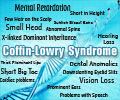The cause of intellectual disability is often linked to the genes. Genetic testing helps to diagnose these defects in genes.

When the chromosomes multiply during cell division, an exact copy of the genes is made in the daughter cell. Sometimes, due to a problem in the process, some genes may be duplicated or deleted. In many individuals, these changes in the genes may not cause any problems. In some cases however, they could lead to intellectual disability.
One of the most familiar conditions with intellectual disability that is related to a duplication of a chromosome is Down’s syndrome. In Down’s syndrome, the cells have three chromosomes 21 in their cells instead of two. Conditions like Prader–Willi and Angelman syndromes, the Williams–Beuren syndrome and the Smith–Magenis syndrome show deletion of particular genes within the chromosomes. These changes have been detected using chromosome-banding techniques. Fluorescence in situ hybridization (FISH) techniques can also detect such changes. Newer techniques like array CGH and SNP genotyping arrays have helped to identify a number of genetic problems.
People with conditions like schizophrenia, epilepsy and attention deficit–hyperactivity disorder (ADHD) often have associated intellectual disability. They have also been found to have genetic abnormalities. Thus, identifying genetic abnormalities can help to correlate intellectual disability with conditions like schizophrenia, epilepsy and ADHD.
In some cases, changes in a single gene may be responsible for intellectual disability. Among these is the fragile X syndrome caused by mutation in the gene FMR1and Rett’s syndrome. Both these conditions are associated with a mutation in the X chromosome.
A number of techniques are used to study gene sequences. Sanger sequencing was the technique used to produce the first complete human genome sequence. Currently, a technique called massive parallel sequencing is used that is quicker and less costly as compared to the initial sequencing technique. In clinical practice, exome sequencing is turning out to be more popular. This technique identifies mutations in the protein-coding parts of the genes and is much more practical that the previous techniques. However, it cannot detect mutations in the non-protein coding parts, which may be necessary to identify certain conditions with intellectual disability.
The newer gene sequencing techniques are slowly making their way into diagnostic laboratories where they can identify genetic diseases more easily, especially those related to intellectual disability.
1 Genomics, Intellectual Disability, and Autism; Heather C Metford et al; N Engl J Med 2012; 366:733-743
Source-Medindia















